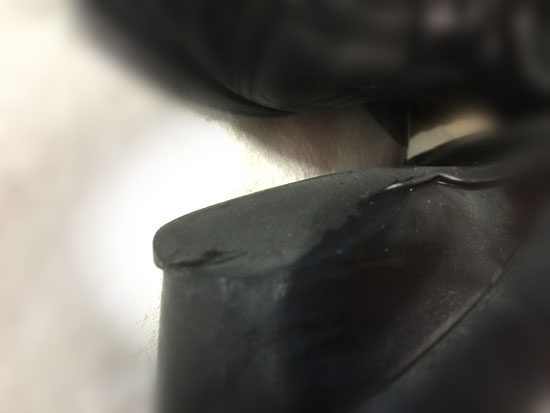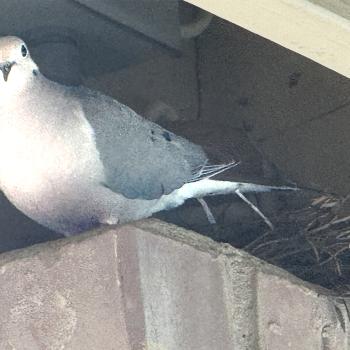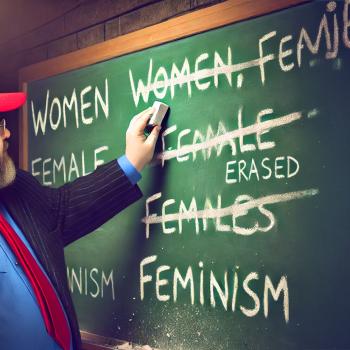
These shoes have seen at least 800,000 steps since September of this year, probably more than a million steps in the two years I have owned them. I recently took them in to get new soles after I realized that I was tilting while walking on them.
In September, I had my “aha” moment. It had been a summer of relative inactivity, compounded by my husband’s foot surgery and my own suddenly worsening cardiac problem. I found myself shocked by how plump I had become.
I also was feeling better than I had in years, thanks to a procedure which corrected that long-standing arrhythmia issue. Probably more than long-standing–according to the cardiologist, I’d probably been dealing with this for 60 years. I lived unaware of its systematic draining of my energy because I didn’t know that this was not abnormal.
And so I began to walk, starting slowly. I remember my first walk, just under a week after the surgery. Relieved, I saw that I could manage a very slow 1 ½ miles, about 75 exercise calories burned.
We had some months before booked a cruise starting early October to parts of Greece and Italy. Our plans included daily walking tours. I needed to get ready for that kind of exertion. I also wanted to switch to these shoes, a comfortable loafer, for walking. They take less packing space and would work for occasions when a regular athletic shoe might look out of place.
I decided to see if I could work up to a 225 calorie walk before leaving for our trip, 30 days away. What I didn’t expect was that I would feel so good that I hit the 225 calorie mark in less than two weeks. By the time I went back for a follow-up with the cardiologist, my morning routine had become a brisk 5 mile, 380 calorie walk.
Now, six miles seems almost too short, so periodically I take seven and eight-mile walks to start my day.
As I said, 800,000 steps in three months on those shoes.
What happened with all that walking?
So, what has happened to me with all that walking? Just for the heck of it, I decided to interview myself about this intriguing time in my life.
Q: Why do you walk?
A: Walking is the one exercise I have ever been able to do. I have so little hand-eye coordination (it is my contention that the words “hand” and “eye” do not ever belong in the same sentence) that sports like tennis are impossible. When I’ve tried jogging, I invariably end up with a nasty stress fracture in my foot. Cycling causes a horrible accumulation of lactic acid in my thighs leaving me uncomfortable to the point of misery. I had engaged a personal trainer at a gym last spring and, while I appreciated her expertise and help, I realized I need to be outside. So I walk. It is also my best prayer time.
Q: Do you listen to music when you walk?
A: Nope. Again, it is my prayer time. I want to focus my mental energy there. Plus, I think it is dangerous to walk outside unable to hear sounds, especially of cars approaching.
Q: How has all that walking affected your weight? You said you had hit a high just before your surgery.
A: Actually, that weight wasn’t my all-time high, but it was higher than I’d been in a couple of years and depressing to boot. Some weight came off–but not as much as one would think with all that walking. I would guess that I’ve lost about one pound for every 100,000 to 120,000 steps, but that is coupling the walking with careful eating.
Q: Describe what you mean by “careful eating.”
A: In the last few years, I slogged through several books on body chemistry and what the scientific community knows about the biology of weight loss. I’ve especially been reading about “metabolic syndrome,” something that appears to be a precursor to diabetes.
Here’s what I’ve gleaned–and keep in mind that I did not fully understand a lot of what I read.
First, our bodies are lazy–we want to use as few calories as possible to do what is necessary for life. That laziness has kept us alive during the times of famine.
In that biochemical laziness, the body prefers that we ingest carbs and sugars. They easily break down into glucose, the energy source of the body.
However, too much glucose in the system is a killer. As soon as circulating glucose spikes, the pancreas releases insulin. Insulin takes up the excess glucose from the blood and stores it in fat cells. It is released as necessary when the blood glucose levels fall too low.
Second, because of the high sugar/carb content of most US diets (so different from the diet of our ancestors), the pancreas gets overworked trying to keep the proper amount of glucose circulating. The result is big spikes and drops.
When the level drops, we crave a quick fix. When we give into that craving and eat a sugar-laden item, the massive insulin push then sticks as much as possible of the circulating glucose into fat cells. At that point, we crave another sugar fix.
From what I can understand, artificial sweeteners bring out the same insulin reaction. Even though they don’t have the calories, they end up making us fatter. The insulin released takes what glucose is available out of the blood stream and into fat cells, leading to actual fat/weight gain.
Sigh.
So, I decided that what I needed to do was eat in a way that avoided the sugar/glucose spikes in my bloodstream. Like it or not, that means a minimal sugar/low carb diet. The only way to lose actual weight was to figure out how to burn that fat.
Exercise/Weight-loss Realities
Q: What’s it like in practice for you?
It came down to two principles for me: get myself into fat-burning mode as soon as possible each day and stay there as long as possible.
I permitted myself a cup of sweetened tea before the morning walks to kickstart the day. After a while, I became so sensitive to my body that I could tell when it switched from burning the glucose to needing to access the fat from my cells. Generally, it was about 1 ½ to two miles into the walk.
Once my metabolism had made the switch to fat burning, I realized that I could walk for long periods without fatigue simply because there was a stable amount of glucose coming into my system. Often, the only reason I needed to end the walks was time pressure or because my feet starting hurting (OK: I’m old and I have bad feet). But my muscles themselves were fine.
The hardest part then was avoiding anything that would put me back in an insulin response. So, no chai lattes, no bread, no potatoes, no fruit or fruit juices, essentially nothing with carbs was an option after walking.
What I discovered was that sparkling water with a twist of fresh lime would work wonders for me. Breakfasts, which I ate about 30 minutes after the walk, were eggs and bacon, eggs and ham, eggs and sausage, eggs and egg.
I rarely ate lunch, but if I did, it was something like tomatoes and cottage cheese. Dinners were a protein source and an exuberant serving of vegetables of some sort. I did indulge in wine in the evenings, however. Perhaps a dessert once a month. Maybe once a week, some rice or a baked potato.
Q: Again, how much weight did you lose?
A: Not very much. That’s what shocked me.
Q: What did you learn from this?
A: Losing weight and keeping it off is the privilege of the well-to-do.
Q: What do you mean?
A: OK, look at it this way. Because I have adequate funds, the following privileges are part of my life:
- Time for long walks.
- Funds for expensive and highly nutritious foods.
- Access to machines to keep my walking clothes clean (only on the coldest of mornings do I come in without sweat-soaked clothes).
- A neighborhood with good sidewalks, dogs always on leashes, and safe for pre-dawn walks.
- Shoes that fit and properly support my feet, re-soled as necessary.
The more I walked, the more aware I became of the privilege of being able to care for myself this way. I kept thinking of and praying for those who work two jobs, parents who barely have 10 minutes a day to themselves, people who live in unsafe/non-sidewalked neighborhoods, and those who are lucky to get any food daily.
Essential Takeways and Wishful Thinking
Q: What’s your takeaway?
A: The idea that those who are overweight can “fix themselves” by diet and exercise is truly tragic for most of us. It just doesn’t work that way for most people. Furthermore, those who have experienced prior chemotherapies or necessary extensive use of steroids generally discover that such therapies permanently disrupt body-weight setpoints.
My personal goal was to burn about 400 exercise calories per day. That would translate into 2800 exercise calories/week. At best, that might mean into a pound off about every nine or ten days. It also requires absolute consistency with eating a very low carb/sugar diet.
That kind of consistency is nearly impossible. PLUS, I became aware that my muscles were getting more efficient, meaning I was burning fewer calories despite the longer walking routines.
Here’s the truth: our bodies have evolved, for good reason, to make weight gain incredibly easy and weight loss tough. That is how humankind has lived through the inevitable famines.
I also think there is another factor involved, although I’ve not seen research to back this up. Both sides of my family come from northern European stock. My ancestors survived by putting on weight in the summer/fall to get through the long, lean, dark, non-food producing winters. Because I started this program in September, I was working against eons of cellular history which said, “GAIN WEIGHT NOW OR YOU WILL DIE!!!”
I am guessing this would be a very different dynamic from those with genetic history from the Southern Hemisphere (longest days in December) or from tropical regions where food is readily available year round.
The main thing: We must stop fat-shaming people for being alive and normal.
Q: Any other observations?
A: Painfully, yes. I just came through a three week period with little exercise and way too much food, especially of the high sugar/high carb kind. I quickly gained several pounds. Clearly, I must choose to live in a highly disciplined, extremely active, food-restricted way to stay healthy. No back-sliding here.
Furthermore, “wishful thinking” as in “this one slip-up won’t hurt me” is a real killer. The body loves carbs. Staying away from them is just tough. Once we start eating them in abundance, the cravings for more grow exponentially. The mind-set of “eating to live” rather than “living to eat” has to take over.
Finally, there is much to be said for simply accepting the bodies we have, even as we seek to care for them. Our media-saturated/manipulated world gives us a skewed view as to what we should and should not look like. Aiming for greater health and energy helps. Aiming to look “perfect” or fit into some predetermined size does not.













